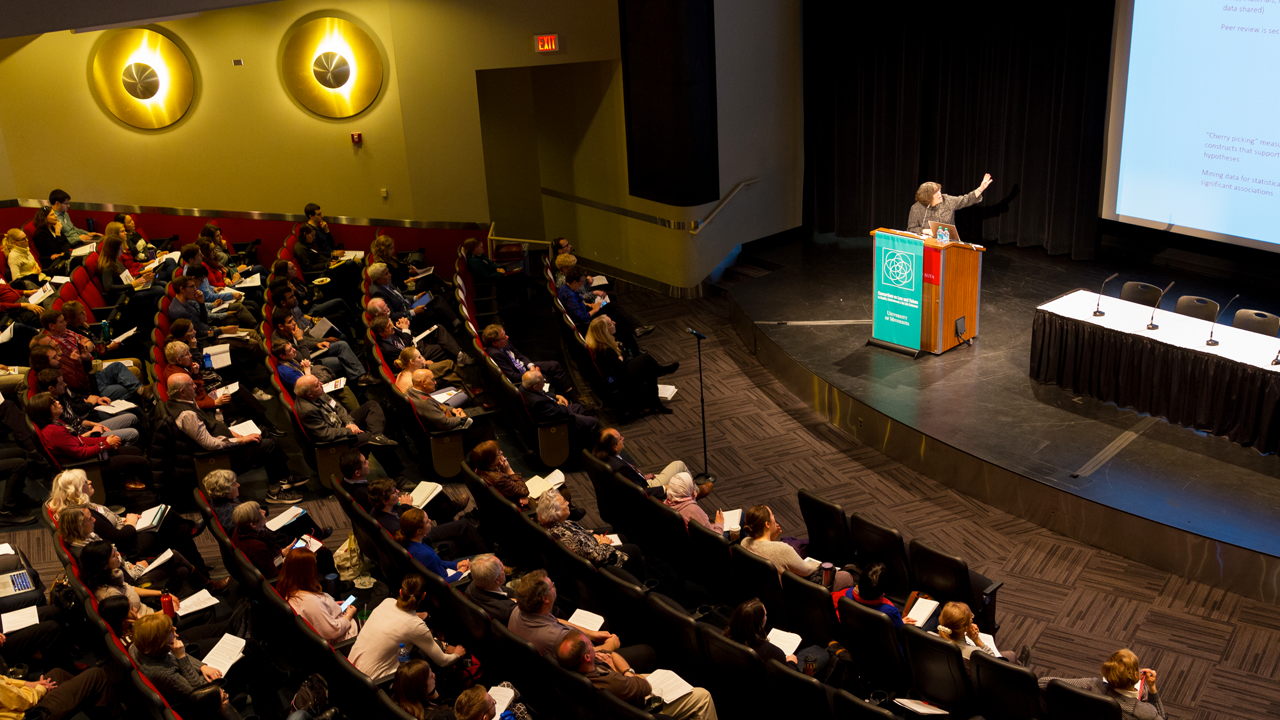
As a recent KARE 11 story showed, falsified research findings can have a misleading or even harmful effect on society. The news report hints at a larger set of issues around research ethics and integrity facing the scientific community today—one that threatens to slow advances in knowledge and undermine the public’s trust in science.
Last week, national experts in biomedicine, the social sciences, law, ethics, and more converged at the University of Minnesota to grapple with how to address pressing research ethics issues, from false findings and researcher misconduct, to inadequate training and lapses in oversight. Research Integrity and Trustworthy Science: Challenges and Solutions, this year’s edition of the U’s annual Research Ethics Conference, centered on how these harmful practices hinder research integrity across the globe.
The conference was hosted by the U’s Consortium on Law and Values in Health, Environment, and the Life Sciences, with support from the Office of the Vice President for Research and Masonic Cancer Center. It was part of Research Ethics Week, a University-wide effort to focus on professional development opportunities and best practices that ensure safety and integrity in research.
During the plenary sessions, conference speakers highlighted how research ethics rely on three parties: researchers, academic journals, and research institutions.
A Higher Standard in Reproducibility
Research ethics begins with the actions of researchers themselves, and one key area for improvement is reproducibility— scientists’ ability to reach the same results as the original investigators when repeating the study.
John P. A. Ioannidis, MD, D.Sc., the C.F. Rehnborg professor in disease prevention at Stanford University, has extensively studied science’s reproducibility crisis and found that replication studies suggest that most statistically significant claims are false positives or fiercely exaggerated. In one example, he showed how scientists could only replicate six out of 53 major studies into the effectiveness of a cancer drug. When reproducibility fails, it slows scientific progress—in this case, toward reaching better treatments and potential cures for cancer.
Reproducibility depends not just on conducting replication studies, Ioannidis said, but on following the same “recipe” as the original researchers. Peer reviewers must make sure to use the same methods and tools, including the same computational algorithms, when attempting to get the same result.
“Scientists need to get it right, not be right,” said Ioannidis. “A lot of what we see now around the debate of reproducibility shows we are making progress.”
Ioannidis also stressed the need to reduce bias in research results, such as “massaging” the data to make it more compelling for publishing or to more convincingly confirm a hypothesis—an issue that appears to be more prominent in some academic fields than others, he notes.
A Publisher’s Influence
One of the strongest ways to encourage research integrity is through academic journals, said Barbara A. Spellman, Ph.D., JD, professor of law and of psychology at the University of Virginia, because the way journals operate can affect how researchers conduct their studies.
“Publication provides an incentive for all of us as researchers,” Spellman said. “But the interesting thing about publishing is it also has this [reverse] influence on all the things we may be doing to get published.”
Journals want to make money and publish papers that reveal exciting new findings—but focusing too heavily on novel, hypothesis-confirming findings distorts the literature, she said. The pressure to confirm a hypothesis in order to get published may tempt researchers to change their hypothesis after their results are in, making the study appear more conclusive than it actually is. Spellman said editors and academic organizations need to increase their focus on peer review practices, and the scientific community needs to place pressure on them to do so.
There are several ways to contend with the bias toward positive results. Preregistration, for example, puts an investigator’s study design through peer review before they collect and analyze data, setting a hypothesis in stone before the data can influence it. Extended methodology sections in published studies can also help, as more specificity makes it easier to replicate the study.
Spellman said the Center for Open Science has found success encouraging practices that support research integrity through its three separate “badges,” which recognize studies with open data, open materials, and preregistered work. Research shows these badges have led to greater data sharing, even though they carry no reward for the researcher beyond recognition.
A Culture of Ethics
While individual researchers hold responsibility for their own actions, C.K. Gunsalus, J.D., director of the National Center for Professional and Research Ethics at the University of Illinois at Urbana-Champaign, said an institution’s culture also plays a large role in promoting ethical research.
A graduate student who notices questionable practices in their faculty advisor’s lab, for example, may hesitate to speak out because they rely on that person for their academic success. The experience sets an example—those who see bad practices go unchecked are less likely to follow ethical standards themselves, Gunsalus said.
“People are influenced by the choices around them,” she said.
Institutions must continually examine their own research ethics culture, Gunsalus said, monitoring research environments and investigating allegations of integrity issues. They must not suppress concerns or allow retaliation toward those who report them.
Part of the solution to a better research culture, she said, involves expanding Responsible Conduct of Research (RCR) training, which focuses on instilling the ethical principles needed to deal with real-world pressures and difficult situations. Gunsalus suggested a more robust RCR training approach that reaches all researchers, from undergraduate students to established faculty.
“The problems only get more subtle and complex as you go,” she said.
Gunsalus recommended the National Academies Press 2017 Fostering Integrity in Research report, which she helped create as part of the committee behind the project, as an ethics reference guide for researchers across disciplines. The report is available for free download.
Watch the Research Ethics Conference recording in full.